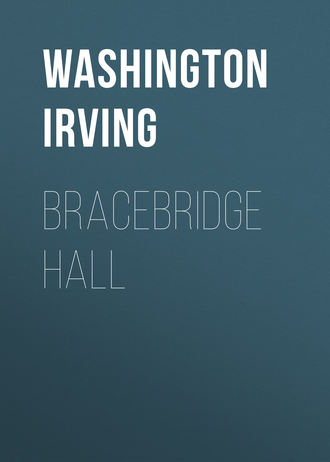
Вашингтон Ирвинг
Bracebridge Hall
HAWKING
The soaring hawk, from fist that flies,
Her falconer doth constrain
Sometimes to range the ground about
To find her out again;
And if by sight, or sound of bell,
His falcon he may see,
Wo ho! he cries, with cheerful voice —
The gladdest man is he.
HANDEFULL OF PLEASANT DELITES.
At an early hour this morning the Hall was in a bustle, preparing for the sport of the day. I heard Master Simon whistling and singing under my window at sunrise, as he was preparing the jesses for the hawk's legs, and could distinguish now and then a stanza of one of his favourite old ditties:
"In peascod time, when hound to horn
Gives note that buck be kill'd;
And little boy with pipe of corn
Is tending sheep a-field," etc.
A hearty breakfast, well flanked by cold meats, was served up in the great hall. The whole garrison of retainers and hangers-on were in motion, reinforced by volunteer idlers from the village. The horses were led up and down before the door; everybody had something to say and something to do, and hurried hither and thither; there was a direful yelping of dogs; some that were to accompany us being eager to set off, and others that were to stay at home being whipped back to their kennels. In short, for once, the good squire's mansion might have been taken as a good specimen of one of the rantipole establishments of the good old feudal times.
Breakfast being finished, the chivalry of the Hall prepared to take the field. The fair Julia was of the party, in a hunting-dress, with a light plume of feathers in her riding-hat. As she mounted her favourite Galloway, I remarked, with pleasure, that old Christy forgot his usual crustiness, and hastened to adjust her saddle and bridle. He touched his cap as she smiled on him and thanked him; and then, looking round at the other attendants, gave a knowing nod of his head, in which I read pride and exultation at the charming appearance of his pupil.
Lady Lillycraft had likewise determined to witness the sport. She was dressed in her broad white beaver, tied under the chin, and a riding-habit of the last century. She rode her sleek, ambling pony, whose motion was as easy as a rocking-chair; and was gallantly escorted by the general, who looked not unlike one of the doughty heroes in the old prints of the battle of Blenheim. The parson, likewise, accompanied her on the other side; for this was a learned amusement in which he took great interest; and, indeed, had given much counsel, from his knowledge of old customs.
At length everything was arranged, and off we set from the Hall. The exercise on horseback puts one in fine spirits; and the scene was gay and animating. The young men of the family accompanied Miss Templeton. She sat lightly and gracefully in her saddle, her plumes dancing and waving in the air; and the group had a charming effect as they appeared and disappeared among the trees, cantering along with the bounding animation of youth. The squire and Master Simon rode together, accompanied by old Christy mounted on Pepper. The latter bore the hawk on his fist, as he insisted the bird was most accustomed to him. There was a rabble rout on foot, composed of retainers from the Hall, and some idlers from the village, with two or three spaniels for the purpose of starting the game.
A kind of corps de reserve came on quietly in the rear, composed of Lady Lillycraft, General Harbottle, the parson, and a fat footman. Her ladyship ambled gently along on her pony, while the general, mounted on a tall hunter, looked down upon her with an air of the most protecting gallantry.
For my part, being no sportsman, I kept with this last party, or rather lagged behind, that I might take in the whole picture; and the parson occasionally slackened his pace and jogged on in company with me.
The sport led us at some distance from the Hall, in a soft meadow reeking with the moist verdure of spring. A little river ran through it, bordered by willows, which had put forth their tender early foliage. The sportsmen were in quest of herons, which were said to keep about this stream.
There was some disputing already among the leaders of the sport. The squire, Master Simon, and old Christy, came every now and then to a pause, to consult together, like the field officers in an army; and I saw, by certain motions of the head, that Christy was as positive as any old, wrong-headed German commander.
As we were prancing up this quiet meadow every sound we made was answered by a distinct echo from the sunny wall of an old building that lay on the opposite margin of the stream; and I paused to listen to the "spirit of a sound," which seems to love such quiet and beautiful places. The parson informed me that this was the ruin of an ancient grange, and was supposed by the country people to be haunted by a dobbie, a kind of rural sprite, something like Robin-Goodfellow. They often fancied the echo to be the voice of the dobbie answering them, and were rather shy of disturbing it after dark. He added, that the squire was very careful of this ruin, on account of the superstition connected with it. As I considered this local habitation of an "airy nothing," I called to mind the fine description of an echo in Webster's Duchess of Malfy:
– "'Yond side o' th' river lies a wall,
Piece of a cloister, which in my opinion
Gives the best echo that you have ever heard:
So plain in the distinction of our words
That many have supposed it a spirit
That answers."
The parson went on to comment on a pleasing and fanciful appellation which the Jews of old gave to the echo, which they called Bath-kool, that is to say, "the daughter of the voice;" they considered it an oracle, supplying in the second temple the want of the Urim and Thummim, with which the first was honoured.4 The little man was just entering very largely and learnedly upon the subject, when we were startled by a prodigious bawling, shouting, and yelping. A flight of crows, alarmed by the approach of our forces, had suddenly risen from a meadow; a cry was put up by the rabble rout on foot – "Now, Christy! now is your time, Christy!" The squire and Master Simon, who were beating up the river banks in quest of a heron, called out eagerly to Christy to keep quiet; the old man, vexed and bewildered by the confusion of voices, completely lost his head: in his flurry he slipped off the hood, cast off the falcon, and away flew the crows, and away soared the hawk.
I had paused on a rising ground, close to Lady Lillycraft and her escort, from whence I had a good view of the sport. I was pleased with the appearance of the party in the meadow, riding along in the direction that the bird flew; their bright beaming faces turned up to the bright skies as they watched the game; the attendants on foot scampering along, looking up, and calling out, and the dogs bounding and yelping with clamorous sympathy.
The hawk had singled out a quarry from among the carrion crew. It was curious to see the efforts of the two birds to get above each other; one to make the fatal swoop, the other to avoid it. Now they crossed athwart a bright feathery cloud, and now they were against the clear blue sky. I confess, being no sportsman, I was more interested for the poor bird that was striving for its life, than for the hawk that was playing the part of a mercenary soldier. At length the hawk got the upper hand, and made a rushing stoop at her quarry, but the latter made as sudden a surge downwards, and slanting up again evaded the blow, screaming and making the best of his way for a dry tree on the brow of a neighbouring hill; while the hawk, disappointed of her blow, soared up again into the air, and appeared to be "raking" off. It was in vain old Christy called and whistled, and endeavoured to lure her down; she paid no regard to him; and, indeed, his calls were drowned in the shouts and yelps of the army of militia that had followed him into the field.
Just then an exclamation from Lady Lillycraft made me turn my head. I beheld a complete confusion among the sportsmen in the little vale below us. They were galloping and running towards the edge of a bank; and I was shocked to see Miss Templeton's horse galloping at large without his rider. I rode to the place to which bank, which almost overhung the stream, I saw at the foot of it the fair Julia, pale, bleeding, and apparently lifeless, supported in the arms of her frantic lover.
In galloping heedlessly along, with her eyes turned upward, she had unwarily approached too near the bank; it had given way with her, and she and her horse had been precipitated to the pebbled margin of the river.
I never saw greater consternation. The captain was distracted; Lady Lillycraft fainting; the squire in dismay; and Master Simon at his wits' end. The beautiful creature at length showed signs of returning life; she opened her eyes; looked around her upon the anxious group, and comprehending in a moment the nature of the scene, gave a sweet smile, and putting her hand in her lover's, exclaimed feebly, "I am not much hurt, Guy!" I could have taken her to my heart for that single exclamation.
It was found, indeed, that she had escaped, almost miraculously, with a contusion of the head, a sprained ankle, and some slight bruises. After her wound was stanched, she was taken to a neighbouring cottage until a carriage could be summoned to convey her home; and when this had arrived, the cavalcade, which had issued forth so gaily on this enterprise, returned slowly and pensively to the Hall.
I had been charmed by the generous spirit shown by this young creature, who, amidst pain and danger, had been anxious only to relieve the distress of those around her. I was gratified, therefore, by the universal concern displayed by the domestics on our return. They came crowding down the avenue, each eager to render assistance. The butler stood ready with some curiously delicate cordial; the old housekeeper was provided with half a dozen nostrums, prepared by her own hands, according to the family receipt book; while her niece, the melting Phoebe, having no other way of assisting, stood wringing her hands and weeping aloud.
The most material effect that is likely to follow this accident is a postponement of the nuptials, which were close at hand. Though I commiserate the impatience of the captain on that account, yet I shall not otherwise be sorry at the delay, as it will give me a better opportunity of studying the characters here assembled, with which I grow more and more entertained.
I cannot but perceive that the worthy squire is quite disconcerted at the unlucky result of his hawking experiment, and this unfortunate illustration of his eulogy on female equitation. Old Christy, too, is very waspish, having been sorely twitted by Master Simon for having let his hawk fly at carrion. As to the falcon, in the confusion occasioned by the fair Julia's disaster the bird was totally forgotten. I make no doubt she has made the best of her way back to the hospitable Hall of Sir Watkyn Williams Wynn; and may very possibly, at this present writing, be pluming her wings among the breezy bowers of Wynnstay.
FORTUNE-TELLING
Each city, each town, and every village
Affords us either an alms or pillage.
And if the weather be cold and raw,
Then in a barn we tumble on straw.
If warm and fair, by yea-cock and nay-cock,
The fields will afford us a hedge or a hay-cock.
MERRY BEGGARS.
As I was walking one evening with the Oxonian, Master Simon, and the general, in a meadow not far from the village, we heard the sound of a fiddle rudely played, and looking in the direction from whence it came, we saw a thread of smoke curling up from among the trees. The sound of music is always attractive; for, wherever there is music, there is good humour, or goodwill. We passed along a footpath, and had a peep, through a break in the hedge, at the musician and his party, when the Oxonian gave us a wink, and told us that if we would follow him we should have some sport.
It proved to be a gipsy encampment, consisting of three or four little cabins, or tents, made of blankets and sail-cloth, spread over hoops that were stuck in the ground. It was on one side of a green lane, close under a hawthorn hedge, with a broad beech-tree spreading above it. A small rill tinkled along close by, through the fresh sward, that looked like a carpet.
A tea-kettle was hanging by a crooked piece of iron, over a fire made from dry sticks and leaves, and two old gipsies, in red cloaks, sat crouched on the grass, gossiping over their evening cup of tea; for these creatures, though they live in the open air, have their ideas of fireside comforts. There were two or three children sleeping on the straw with which the tents were littered; a couple of donkeys were grazing in the lane, and a thievish-looking dog was lying before the fire. Some of the younger gipsies were dancing to the music of a fiddle, played by a tall, slender stripling, in an old frock coat, with a peacock's feather stuck in his hatband.
As we approached, a gipsy girl, with a pair of fine roguish eyes, came up, and, as usual, offered to tell our fortunes. I could not but admire a certain degree of slattern elegance about the baggage. Her long black silken hair was curiously plaited in numerous small braids, and negligently put up in a picturesque style that a painter might have been proud to have devised. Her dress was of a figured chintz, rather ragged, and not over clean, but of a variety of most harmonious and agreeable colours; for these beings have a singularly fine eye for colours. Her straw hat was in her hand, and a red cloak thrown over one arm.
The Oxonian offered at once to have his fortune told, and the girl began with the usual volubility of her race; but he drew her on one side near the hedge, as he said he had no idea of having his secrets overheard. I saw he was talking to her instead of she to him, and by his glancing towards us now and then, that he was giving the baggage some private hints. When they returned to us, he assumed a very serious air. "Zounds!" said he, "it's very astonishing how these creatures come by their knowledge; this girl has told me some things that I thought no one knew but myself!"
The girl now assailed the general: "Come, your honour," said she, "I see by your face you're a lucky man; but you're not happy in your mind; you're not, indeed, sir; but have a good heart, and give me a good piece of silver, and I'll tell you a nice fortune."
The general had received all her approaches with a banter, and had suffered her to get hold of his hand; but at the mention of the piece of silver, he hemmed, looked grave, and turning to us, asked if we had not better continue our walk. "Come, my master," said the girl archly, "you'd not be in such a hurry, if you knew all that I could tell you about a fair lady that has a notion for you. Come, sir, old love burns strong; there's many a one comes to see weddings that go away brides themselves!" Here the girl whispered something in a low voice, at which the general coloured up, was a little fluttered, and suffered himself to be drawn aside under the hedge, where he appeared to listen to her with great earnestness, and at the end paid her half-a-crown with the air of a man that has got the worth of his money.
The girl next made her attack upon Master Simon, who, however, was too old a bird to be caught, knowing that it would end in an attack upon his purse, about which he is a little sensitive. As he has a great notion, however, of being considered a roister, he chucked her under the chin, played her off with rather broad jokes, and put on something of the rake-helly air, that we see now and then assumed on the stage by the sad-boy gentlemen of the old school. "Ah, your honour," said the girl, with a malicious leer, "you were not in such a tantrum last year when I told you about the widow you know who; but if you had taken a friend's advice, you'd never have come away from Doncaster races with a flea in your ear!"
There was a secret sting in this speech that seemed quite to disconcert Master Simon. He jerked away his hand in a pet, smacked his whip, whistled to his dogs, and intimated that it was high time to go home. The girl, however, was determined not to lose her harvest. She now turned upon me, and, as I have a weakness of spirit where there is a pretty face concerned, she soon wheedled me out of my money, and in return read me a fortune which, if it prove true, and I am determined to believe it, will make me one of the luckiest men in the chronicles of Cupid.
I saw that the Oxonian was at the bottom of all this oracular mystery, and was disposed to amuse himself with the general, whose tender approaches to the widow have attracted the notice of the wag. I was a little curious, however, to know the meaning of the dark hints which had so suddenly disconcerted Master Simon: and took occasion to fall in the rear with the Oxonian on our way home, when he laughed heartily at my questions, and gave me ample information on the subject.
The truth of the matter is, that Master Simon has met with a sad rebuff since my Christmas visit to the Hall. He used at that time to be joked about a widow, a fine dashing woman, as he privately informed me. I had supposed the pleasure he betrayed on these occasions resulted from the usual fondness of old bachelors for being teased about getting married, and about flirting, and being fickle and false-hearted. I am assured, however, that Master Simon had really persuaded himself the widow had a kindness for him; in consequence of which he had been at some extraordinary expense in new clothes, and had actually got Frank Bracebridge to order him a coat from Stultz. He began to throw out hints about the importance of a man's settling himself in life before he grew old; he would look grave whenever the widow and matrimony were mentioned in the same sentence; and privately asked the opinion of the squire and parson about the prudence of marrying a widow with a rich jointure, but who had several children.
An important member of a great family connection cannot harp much upon the theme of matrimony without its taking wind; and it soon got buzzed about that Mr. Simon Bracebridge was actually gone to Doncaster races, with a new horse, but that he meant to return in a curricle with a lady by his side. Master Simon did, indeed, go to the races, and that with a new horse; and the dashing widow did make her appearance in her curricle; but it was unfortunately driven by a strapping young Irish dragoon, with whom even Master Simon's self-complacency would not allow him to enter into competition, and to whom she was married shortly after.
It was a matter of sore chagrin to Master Simon for several months, having never before been fully committed. The dullest head in the family, had a joke upon him; and there is no one that likes less to be bantered than an absolute joker. He took refuge for a time at Lady Lillycraft's, until the matter should blow over; and occupied himself by looking over her accounts, regulating the village choir, and inculcating loyalty into a pet bullfinch by teaching him to whistle "God save the King."
He has now pretty nearly recovered from the mortification; holds up his head, and laughs as much as any one; again affects to pity married men, and is particularly facetious about widows, when Lady Lillycraft is not by. His only time of trial is when the general gets hold of him, who is infinitely heavy and persevering in his waggery, and will interweave a dull joke through the various topics of a whole dinner-time. Master Simon often parries these attacks by a stanza from his old work of "Cupid's Solicitor for Love:"
"'Tis in vain to woo a widow over long,
In once or twice her mind you may perceive;
Widows are subtle, be they old or young,
And by their wiles young men they will deceive."
LOVE-CHARMS
– Come, do not weep, my girl,
Forget him, pretty pensiveness; there will
Come others, every day, as good as he.
SIR J. SUCKLING.
The approach of a wedding in a family is always an event of great importance, but particularly so in a household like this, in a retired part of the country. Master Simon, who is a pervading spirit, and, through means of the butler and housekeeper, knows everything that goes forward, tells me that the maid-servants are continually trying their fortunes, and that the servants' hall has of late been quite a scene of incantation.
It is amusing to notice how the oddities of the head of a family flow down through all the branches. The squire, in the indulgence of his love of everything that smacks of old times, has held so many grave conversations with the parson at table, about popular superstitions and traditional rites, that they have been carried from the parlour to the kitchen by the listening domestics, and, being apparently sanctioned by such high authorities, the whole house has become infected by them.
The servants are all versed in the common modes of trying luck, and the charms to ensure constancy. They read their fortunes by drawing strokes in the ashes, or by repeating a form of words, and looking in a pail of water. St. Mark's Eve, I am told, was a busy time with them; being an appointed night for certain mystic ceremonies. Several of them sowed hemp-seed, to be reaped by their true lovers; and they even ventured upon the solemn and fearful preparation of the dumb-cake. This must be done fasting and in silence. The ingredients are handed down in traditional form: – "An egg-shell full of salt, an egg-shell full of malt, and an egg-shell full of barley meal." When the cake is ready, it is put upon a pan over the fire, and the future husband will appear, turn the cake, and retire; but if a word is spoken, or a fast is broken, during this awful ceremony, there is no knowing what horrible consequence would ensue!
The experiments in the present instance came to no result; they that sowed the hemp-seed forgot the magic rhyme that they were to pronounce, so the true lover never appeared; and as to the dumb-cake, what between the awful stillness they had to keep, and the awfulness of the midnight hour, their hearts failed them when they had put the cake in the pan, so that, on the striking of the great house-clock in the servants' hall, they were seized with a sudden panic, and ran out of the room, to which they did not return until morning, when they found the mystic cake burnt to a cinder.
The most persevering at these spells, however, is Phoebe Wilkins, the housekeeper's niece. As she is a kind of privileged personage, and rather idle, she has more time to occupy herself with these matters. She has always had her head full of love and matrimony, she knows the dreaming book by heart, and is quite an oracle among the little girls of the family, who always come to her to interpret their dreams in the mornings.
During the present gaiety of the house, however, the poor girl has worn a face full of trouble; and, to use the housekeeper's words, "has fallen into a sad hystericky way lately." It seems that she was born and brought up in the village, where her father was parish-clerk, and she was an early playmate and sweetheart of young Jack Tibbets. Since she has come to live at the Hall, however, her head has been a little turned. Being very pretty, and naturally genteel, she has been much noticed and indulged: and being the housekeeper's niece, she has held an equivocal station between a servant and a companion. She has learnt something of fashions and notions among the young ladies, which have effected quite a metamorphosis; insomuch that her finery at church on Sundays has given mortal offence to her former intimates in the village. This has occasioned the misrepresentations which have awakened the implacable family pride of Dame Tibbets. But what is worse, Phoebe, having a spice of coquetry in her disposition, showed it on one or two occasions to her lover, which produced a downright quarrel; and Jack, being very proud and fiery, has absolutely turned his back upon her for several successive Sundays.
The poor girl is full of sorrow and repentance, and would fain make up with her lover; but he feels his security, and stands aloof. In this he is doubtless encouraged by his mother, who is continually reminding him of what he owes to his family; for this same family pride seems doomed to be the eternal bane of lovers.
As I hate to see a pretty face in trouble, I have felt quite concerned for the luckless Phoebe, ever since I heard her story. It is a sad thing to be thwarted in love at any time, but particularly so at this tender season of the year, when every living thing, even to the very butterfly, is sporting with its mate; and the green fields and the budding groves, and the singing of the birds, and the sweet smell of the flowers, are enough to turn the head of a love-sick girl. I am told that the coolness of Young Ready-Money lies heavy at poor Phoebe's heart. Instead of singing about the house as formerly, she goes about, pale and sighing, and is apt to break into tears when her companions are full of merriment.
Mrs. Hannah, the vestal gentlewoman of my Lady Lillycraft, has had long talks and walks with Phoebe, up and down the avenue, of an evening; and has endeavoured to squeeze some of her own verjuice into the other's milky nature. She speaks with contempt and abhorrence of the whole sex, and advises Phoebe to despise all the men as heartily as she does. But Phoebe's loving temper is not to be curdled; she has no such thing as hatred or contempt for mankind in her whole composition. She has all the simple fondness of heart of poor, weak, loving woman; and her only thoughts at present are, how to conciliate and reclaim her wayward swain.
The spells and love-charms, which are matters of sport to the other domestics, are serious concerns with this love-stricken damsel. She is continually trying her fortune in a variety of ways. I am told that she has absolutely fasted for six Wednesdays and three Fridays successively, having understood that it was a sovereign charm to ensure being married to one's liking within the year. She carries about, also, a lock of her sweetheart's hair, and a riband he once gave her, being a mode of producing constancy in her lover. She even went so far as to try her fortune by the moon, which has always had much to do with lovers' dreams and fancies. For this purpose she went out in the night of the full moon, knelt on a stone in the meadow, and repeated the old traditional rhyme:
"All hail to thee, moon, all hail to thee:
I pray thee, good moon, now show to me
The youth who my future husband shall be."
When she came back to the house, she was faint and pale, and went immediately to bed. The next morning she told the porter's wife that she had seen some one close by the hedge in the meadow, which she was sure was young Tibbets; at any rate, she had dreamt of him all night; both of which, the old dame assured her, were most happy signs. It has since turned out that the person in the meadow was old Christy, the huntsman, who was walking his nightly rounds with the great staghound; so that Phoebe's faith in the charm is completely shaken.







